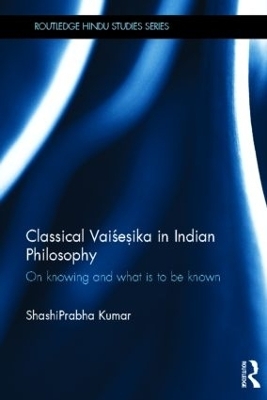
Classical Vaisesika in Indian Philosophy
On Knowing and What is to Be Known
Seiten
2013
Routledge (Verlag)
978-0-415-54918-9 (ISBN)
Routledge (Verlag)
978-0-415-54918-9 (ISBN)
Vaisesika is one of the six systems of Hindu philosophy. It represents a pluralistic realism and is usually held to be an atomistic, metaphysical theory. This book explores the basic tenets of the Vaisesika classical school of Indian philosophy from a new perspective. It argues that it reveals an epistemological formulation of its own, which was diminished due to later developments in the history of Indian philosophical tradition.
Focusing on the principles of knowable objects and the processes of knowing as propounded by the Vaisesika school of Indian Philosophy, the book offers a fuller appreciation of the theories. Providing a balanced approach by examining earliest available material in the original sources of Vaisesika and concentrating on the epistemological pattern adopted therein, it presents an authentic and comprehensive understanding of Vaisesika concepts. This is the first introductory sourcebook in English for the authentic study of Vaisesika, and is of use to students and scholars of World Religion and Philosophy.
Focusing on the principles of knowable objects and the processes of knowing as propounded by the Vaisesika school of Indian Philosophy, the book offers a fuller appreciation of the theories. Providing a balanced approach by examining earliest available material in the original sources of Vaisesika and concentrating on the epistemological pattern adopted therein, it presents an authentic and comprehensive understanding of Vaisesika concepts. This is the first introductory sourcebook in English for the authentic study of Vaisesika, and is of use to students and scholars of World Religion and Philosophy.
Shashiprabha Kumar is Professor and Chairperson of the Special Centre for Sanskrit Studies at Jawaharlal Nehru University, India.
1. Introduction 2. Theme of Knowing in Vaisesika: Dharma 3. Objects of Knowing (Padarthas) 4. Methods of Knowing (Sadharmya and Vaidharmya) 5. Modes and Means of Knowing (Jnana-Prakara and Pramana) 6. Agent of Knowing (Atman) 7. Abode and Faculties of Knowing (Sarira and Indriyas) 8. Instrument of Knowing (Manas) 9. Goal of Knowing (Nihsreyasa) 10. An Overview
| Erscheint lt. Verlag | 19.3.2013 |
|---|---|
| Reihe/Serie | Routledge Hindu Studies Series |
| Verlagsort | London |
| Sprache | englisch |
| Maße | 156 x 234 mm |
| Gewicht | 490 g |
| Themenwelt | Geisteswissenschaften ► Philosophie ► Östliche Philosophie |
| Geisteswissenschaften ► Religion / Theologie ► Hinduismus | |
| Sozialwissenschaften ► Politik / Verwaltung | |
| Sozialwissenschaften ► Soziologie ► Spezielle Soziologien | |
| ISBN-10 | 0-415-54918-3 / 0415549183 |
| ISBN-13 | 978-0-415-54918-9 / 9780415549189 |
| Zustand | Neuware |
| Haben Sie eine Frage zum Produkt? |
Mehr entdecken
aus dem Bereich
aus dem Bereich


